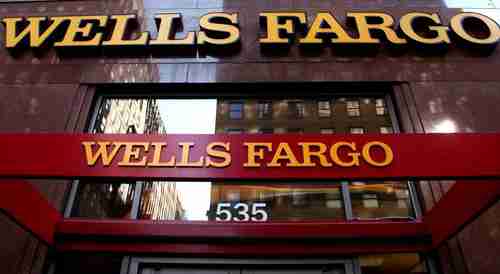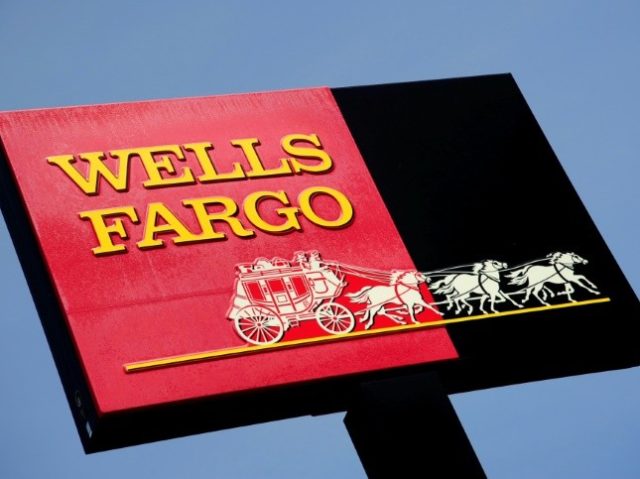This morning’s key headlines from GenerationalDynamics.com
- Wells Fargo found to have defrauded millions of customers
- Reasons given why no criminal prosecutions of bankers for criminal fraud
Wells Fargo found to have defrauded millions of customers

Wells Fargo branch in New York (AP)
An audit consulting firm has determined that Wells Fargo opened over 1.5 million “ghost” bank accounts in the name of customers who didn’t even know about it.
Apparently the way it worked was as follows:
- A Wells Fargo employee created a new “ghost” checking account in the name of an existing customer, without notifying the customer. There were 1.5 million “ghost” checking accounts.
- The employee moved funds from the customer’s existing account into the ghost account, so that the account would look valid.
- The employee’s high sales volume would be rewarded with big bonuses, in addition to their already high salaries.
- Customers were being charged for insufficient funds or overdraft fees — because there wasn’t enough money in their original accounts.
- Employees also created half a million “ghost” credit card accounts, with phony PIN numbers and fake e-mail addresses, to enroll customers in online banking services.
- Customers would be assessed non-payment fees. Since the customers weren’t even aware of the ghost checking and credit card accounts, the overdraft and non-payment fees would often be unpaid, harming their credit ratings, forcing them into car loans or mortgage loans with high interest rates.
This wasn’t one or two rogue employees. This was thousands of employees defrauding millions of customers. The size of this fraud is mind-boggling. The number of crooked employees is staggering. The number of defrauded customers is beyond belief.
And yet it’s clear that nobody will go to jail. The crooked employees will keep their huge bonuses, and even if they’ve been fired, they’ll be perfectly free to go on to other jobs and defraud other people, because with the rise of Generation-X, fraud has essentially become a free crime.
Wells Fargo was fined $185 million by the Consumer Finance Protection Bureau. Wells Fargo’s net income in the second quarter was $5.6 billion, so the fine is just 3.3% of one quarter’s net income (or less than 1% of annual income). Wells Fargo’s CEO John Stumpf was fired and fined $41 million, but that leaves him with more than $100 million in company stock and millions in salary.
I’ve already used the words “mind-boggling,” “staggering” and “beyond belief,” so there are no words left to describe the enormity of this farce. Bankers can get away with almost anything today, with no punishment except sometimes to give back a small portion of their fraudulent gains, and then they’re free to go to the next fraud.
I’ve written about this many times in the past. First there was the “financial crisis” of the mid-2000s decade. That was created by Gen-Xers who poured out of colleges in the 1990s with masters degrees in financial engineering. Those crooks knowingly created tens of trillions of dollars in fraudulent securities, and sold them to investors knowing that they were defrauding the investors.
And not a single goddamn one of these crooks has gone to jail or even been criminally prosecuted.
Instead, President Obama’s Department of Justice adamantly refused to prosecute these crooks, but instead chose to accept billions of dollars in campaign contributions from the very banks that had made trillions of dollars fraudulently, putting millions of people into bankruptcy or homelessness after being unable to pay their sub-prime mortgages. I’ve never believed this massive level of government corruption was possible in America, but it’s happening.
In 2010, congressional Financial Crisis Inquiry hearings provide ‘smoking gun’ evidence of widespread criminal fraud. I expected investigations and prosecutions to begin at that time, but there were none. In fact, as described in the movie “The Big Short,” the crooks were financially rewarded by the administration for their criminal fraud.
I’ve written many, many times, that the failure of the administration to criminally prosecute these crooked backs would leave the same bankers in the same jobs finding other ways to defraud people. That’s exactly what’s happened. The massive Wells Fargo frauds began in 2011, according to reports. The massive Libor and Forex rate-rigging began around the same time.
I believe that when the 2010 Financial Crisis Inquiry hearings were completed and the crooked bankers were rewarded instead of being prosecuted, it was a signal to bankers that they could do anything they wanted, with impunity. This does not mean all bankers, of course, but it means a significant minority.
As for bankers, I remember when I was growing up in the 1950s how much my mother hated bankers, and thought they were all crooks. Bankers seemed like nice people to me, so I never understood why she felt that way. But I understand now. She had grown up in the 1930s, a time when bankers were just as crooked as they are today.
If you’d like to take a few moments for some musical entertainment, then listen to the song “Little Tin Box” from the 1959 Broadway Musical Fiorello!, about how 1930s politicians made millions of dollars and claimed they did it by saving their pennies in a “Little Tin Box.” YouTube: Fiorello – ‘Little Tin Box’ – original Broadway version and CNN and LA Times
Related Articles
- The nihilism and self-destructiveness of Generation X (21-Jan-2008)
- Reader comments on the Nihilism of Generation-X (29-Jan-2008)
Reasons given why no criminal prosecutions of bankers for criminal fraud
In reading and listening to news reports on the financial crisis, reasons are sometimes given for why no one has been criminally prosecuted. Above, I gave what I think is the real reasons — federal government corruption. But mainstream media reporters don’t want to criticize this administration, so they look for other reasons.
All the banking laws were repealed by the Clinton and Bush administrations, so they can’t be prosecuted.
The laws on criminal fraud have never been repealed. The 2010 congressional Financial Crisis Inquiry hearings found “smoking gun” evidence of criminal fraud.
If bankers are prosecuted, then banks will become unable to do business, because they’ll be unable to hire the right talent for the most difficult jobs.
Believe it or not, I’ve actually seen this utterly moronic reason given for why bankers weren’t prosecuted. Of course talented people will want to work for banks — to get those 6 and 7 digit salaries, and also to get HONEST bonuses.
Sometimes building a strong case against individuals can be difficult given how big and complicated banks are, and sometimes, even when there is evidence, that evidence points not to the C-suite suits, but middle-manager types.
So what? If some “middle-manager types” are prosecuted, then other “middle-manager types” will fear committing more crimes. As I said, I believe that the failure to prosecute after the 2010 congressional hearings was a signal to bankers that they could do anything they wanted, with impunity.
Second, prosecuting “middle-manager types” allows for discovery, and allows for getting low-level employees to turn on their bosses, so that “the C-suite suits” can be prosecuted as well.
These reasons all miss the major point: that the Wells Fargo, Libor, Forex and other banking scams came about because bankers knew that they could do anything they wanted, and the worst that would happen is that they’d have to give up a small portion of their fraudulent gains.
New York Magazine quotes Notre Dame law professor Jimmy Gurulé in listing many recent instances of banks engaging in massive criminal activity, and coming away only with monetary punishments:
To take just a handful of them: In 2012, Standard Chartered was found to have violated the U.S.’s economics sanctions by moving hundreds of billions of dollars for Iran, and settled for $330 million. In 2012, federal investigators found that HSBC had, as the Times put it, “transferred billions of dollars for nations under United States sanctions, enabled Mexican drug cartels to launder tainted money through the American financial system, and worked closely with Saudi Arabian banks linked to terrorist organizations.” HSBC paid $1.92 billion. Then there was Barclays in 2010 — a fine of $298 million for illegal dealings with Cuba, Iran, Libya, Sudan, and Myanmar (before reluctantly approving the settlement, the judge in that case called it a “sweetheart deal”). Also, Credit Suisse in 2009: it settled for $536 million in connection with similar charges.
So if you’re a banker, then what’s the point of being honest? You can get away with anything you want, and you won’t be prosecuted. It’s mind-boggling. Washington Post and New York Magazine
Related Articles
- Financial Crisis Inquiry hearings provide ‘smoking gun’ evidence of widespread criminal fraud (14-Apr-2010)
- ‘The Big Short’ – an infuriating movie about the financial crisis (26-Dec-2015)
- Reader comments on ‘The Big Short’ and the financial crisis (27-Dec-2015)
KEYS: Generational Dynamics, Wells Fargo, John Stumpf, Consumer Finance Protection Bureau, CFPB, Financial Crisis Inquiry, Libor, Forex, The Big Short, Jimmy Gurulé, Notre Dame, Fiorello!, Little Tin Box
Permanent web link to this article
Receive daily World View columns by e-mail

COMMENTS
Please let us know if you're having issues with commenting.